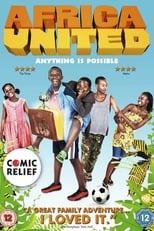Africa United starts off with Dudu, a young AIDS orphan in Rwanda, lecturing even younger boys on the use of condoms to protect against the disease. He then blows up the condom and turns it into a homemade soccer ball.
While surviving on the street with his little sister Beatrice, Dudu also “manages” Fabrice, the best youth footballer in the town. Fabrice is invited to tryout for a team that will appear in the opening ceremony for WC 2010 in Johannesberg, but his conventional mother won’t allow him to go. As Fabrice’s Manager, Dudu has to figure out how to get his client and sister to the game 3,000 miles away.
Because he’s just a kid, most of his decisions are wrong, resulting in a tortuous journey. In DR Congo, the trio are joined by a child soldier who has stolen a bag of money from his general, making them a target of his former squad. The kids canoe across Lake Tanganyika to a Burundi resort where the owner grabs the money bag, but teenage sex worker Celeste helps thwart him and also joins their journey.
Now numbering five and from different countries, the kids call themselves Africa United, with their mission to get Fabrice to the opening game. However, they are beset by challenges, the least of which are traveling without papers or money, hitchhiking, stowing away, and facing wild animals. On top of that, they are pursued and beaten by the Congolese soldiers, Fabrice fires a gun for the first time, they are robbed by other children, they donate blood for money and find out their HIV status, and Dudu is weakened by TB and HIV. Finally, they are unable to cross into South Africa until an adult finally believes their story and gets them to the stadium.
A family film
Initially, I wondered how they could call this a family film or comedy-drama, or how anyone could find such a tale uplifting, as stated in quite a few reviews. It was only after I read an interview of the writer Rhidian Brook that I understood what the creators were trying to communicate. In 2006, Brook had taken his family, including children aged 6 and 9, on a 9-month sabbatical in Africa to write about the Salvation Army and its work in the AIDS epidemic. He said,
“Just when we thought we should protect them from some unpleasant reality, with the clarity that comes of innocence, they would show a capacity to see exactly what was what. … I sometimes wondered if it was a good thing exposing my children to some of the things we encountered – the sickness, pain and loss caused by AIDS – but even the most uncomfortable situations seemed to have a redeeming quality.”
Rhidian Brook, The Guardian Oct-22-2010
In interviews of Rwandan producer Eric Kabera and first-feature Director Debs Paterson, they iterated that so many films about Africa focus on human disasters, genocides, or safaris. Paterson maintained that kids today are very aware of what is going on in the world. Putting difficult issues in a family film shows that even in a tough environment, children can still think everything is possible and still have dreams.
And so with the real-life poverty and beauty of Africa as a non-judgmental background, the uplifting part of the story is that a team can accomplish the impossible, and that teamwork means honoring, respecting, and forgiving your teammates.
“…a good small community can make a huge difference to a culture; … much of the world is being held together not by money, power, guns or celebrity but by small, often hidden, acts of kindness.”
Rhidian Brook, ibid
There are acts of kindness throughout the film, and when you think about it, forgiveness and self-forgiveness are each a kindness. That being said, I forgive this film for having very little soccer in it. However, note that the scenes of World Cup fan celebrations outside the opening game are authentic footage!
The cast
When I review a film that is already 12 years old, I like to find out what has happened to the cast. The 5 main actors of Africa United were around 14-16 years old at the time. None of them had acted before.
Roger Nsengiyumva (Fabrice) was discovered just a few weeks before filming began, because he was trying out for Norwich and had fled Rwanda to England as a baby. He is still working as an actor. Sherrie Silver (Celeste) is another Rwandan migrant who grew up in England and is now a dancer/choreographer with a popular Youtube channel. I could find no further information about Eriya Ndayambaje, who is from Uganda and puts in an amazing performance as the fast-talking Dudu.
Director Debs Gardner Paterson comes from multiple generations of missionaries and has both Rwandan and football background. She appears to have established a very successful directing career. As in the film’s story, Paterson overcame a number of challenges in her first feature, where she managed crews of 80-150 in Rwanda and South Africa. She noted that they started filming in April and held the premiere in Toronto in September.
The film is very entertaining and 12 years on, like the story Dudu weaves for his comrades, we should consider Africa United a modern fairytale.
8 Soccer Movie Mom Rating = 8
Resources:
- Released: 2010-10-22 (London Film Festival)
- 88 minutes
- I watched this on Netflix
- In English, no English sub-titles (which I badly needed)
- IMDB
- WIKI
- Director: Debs Paterson
- Stars: Eriya Ndayambaje (Dudu), Roger Nsengiyumva (Fabrice) , Sherrie Silver (Celeste)
- Watch the Trailer
- Footprint Films Website

